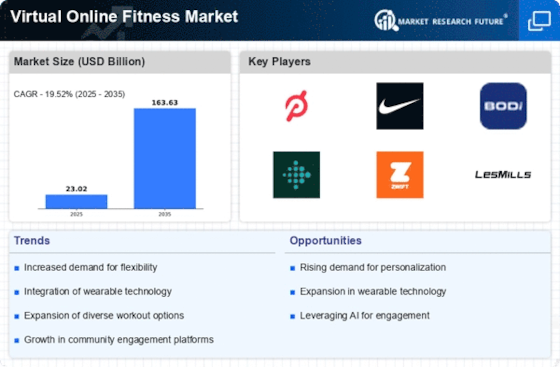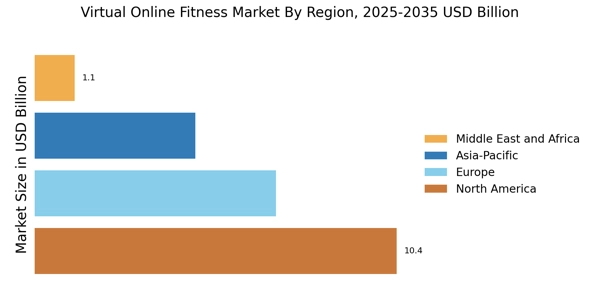The Virtual Online Fitness Market is currently characterized by a dynamic competitive landscape, driven by technological advancements and shifting consumer preferences towards digital fitness solutions. Key players such as Peloton (US), Nike (US), and Beachbody (US) are strategically positioning themselves through innovation and partnerships, thereby enhancing their operational focus. Peloton (US) continues to leverage its strong brand presence and community engagement, while Nike (US) emphasizes its integration of fitness technology with wearable devices. Beachbody (US) is expanding its content offerings, focusing on personalized fitness experiences, which collectively shapes a competitive environment that is increasingly reliant on
digital transformation and user engagement.The market structure appears moderately fragmented, with a blend of established brands and emerging startups vying for consumer attention. Companies are adopting various business tactics, such as localizing content and optimizing supply chains to enhance service delivery. This competitive structure allows for a diverse range of offerings, catering to different consumer segments and preferences, which in turn influences market dynamics and growth potential.
In August Peloton (US) announced a strategic partnership with a leading health app to integrate
personalized nutrition plans into its fitness platform. This move is significant as it not only diversifies Peloton's offerings but also positions the company as a holistic health solution provider, potentially increasing user retention and engagement. The integration of nutrition with fitness reflects a broader trend towards comprehensive wellness solutions in the virtual fitness space.
In September Nike (US) launched a new AI-driven fitness coaching feature within its app, aimed at providing users with tailored workout plans based on individual performance metrics. This innovation underscores Nike's commitment to leveraging technology to enhance user experience and engagement. By utilizing AI, Nike is likely to attract a tech-savvy demographic, further solidifying its market position amidst growing competition.
In July Beachbody (US) expanded its subscription model to include live-streaming classes, a move that aligns with consumer demand for real-time interaction and community engagement. This strategic action not only enhances the user experience but also differentiates Beachbody from competitors who primarily offer on-demand content. The introduction of live classes may foster a sense of community among users, which is increasingly valued in the virtual fitness market.
As of October current trends in the Virtual Online Fitness Market are heavily influenced by
digitalization, sustainability, and the integration of artificial intelligence. Strategic alliances among key players are shaping the landscape, fostering innovation and enhancing service offerings. The competitive differentiation is likely to evolve from traditional price-based competition towards a focus on technological innovation, user experience, and supply chain reliability, indicating a shift towards a more sophisticated and consumer-centric market.


















